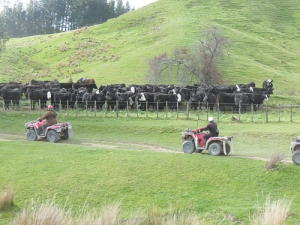Simon Upton urges cross-party consensus on New Zealand environmental goals
Parliamentary Commissioner for the Environment Simon Upton is calling for cross-party consensus on the country's overarching environmental goals.
 Compliance manager Simon Mapp says Southland's significant non-compliance rate is one of the lowest in the country.
Compliance manager Simon Mapp says Southland's significant non-compliance rate is one of the lowest in the country.
Once again, it has been a year of pleasing results from industry, incidents and the dairy sector, the annual compliance monitoring report compiled by Environment Southland has found.
Compliance manager Simon Mapp says Southland's significant non-compliance rate is one of the lowest in the country.
For the third year in a row there has been a reduction in significant non-compliance on effluent discharge consents. The rate of significant non-compliance is now at 4.5%, down from 6% last year.
Southland industries continue to perform well, with NZAS, Meridian Energy and Solid Energy setting a good standard for environmental compliance. Mapp says it was also pleasing to see the improvement made by Takitimu Coal and Pioneer Energy.
Regulatory Services committee chairman Neville Cook says it's really good to see the steady improvements. "It shows that the educative programme is working. If we inform people better, then they'll try and comply with the rules and get the results everyone wants for the environment."
In the coming year the compliance division will be taking an education-first approach to the implementation of the Proposed Regional Air Plan as they support the change in home heating with the goal of improving air quality.
According to Ravensdown's most recent Market Outlook report, a combination of geopolitical movements and volatile market responses are impacting the global fertiliser landscape.
Environment Canterbury, alongside industry partners and a group of farmers, is encouraging farmers to consider composting as an environmentally friendly alternative to offal pits.
A New Zealand dairy industry leader believes the free trade deal announced with India delivers wins for the sector.
The Coalition Government will need the support of at least one opposition party to ratify the free trade deal with India.
Primary sector leaders have welcomed the announcement of a Free Trade Agreement between India and New Zealand.
At Pāmu’s Kepler Farm in Manapouri, mating has wrapped up at the across-breed Beef Progeny Test.

OPINION: The release of the Natural Environment Bill and Planning Bill to replace the Resource Management Act is a red-letter day…
OPINION: Federated Farmers has launched a new campaign, swapping ‘The Twelve Days of Christmas’ for ‘The Twelve Pests of Christmas’ to…